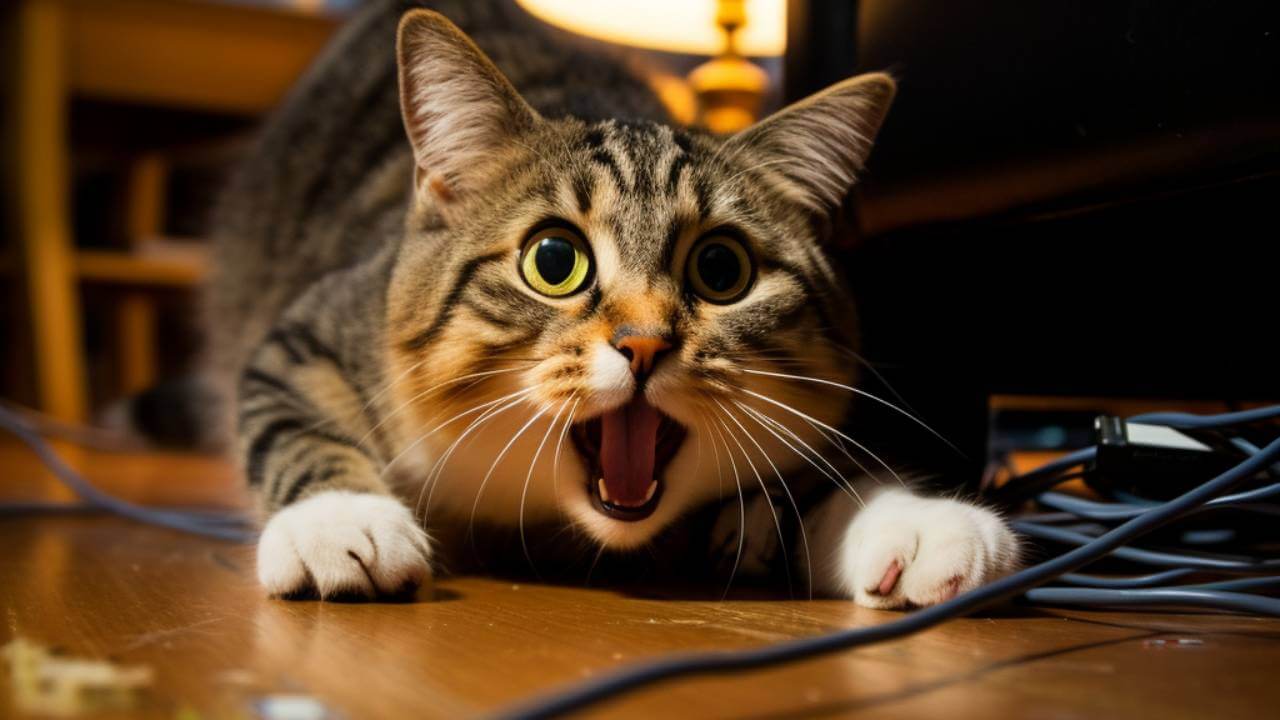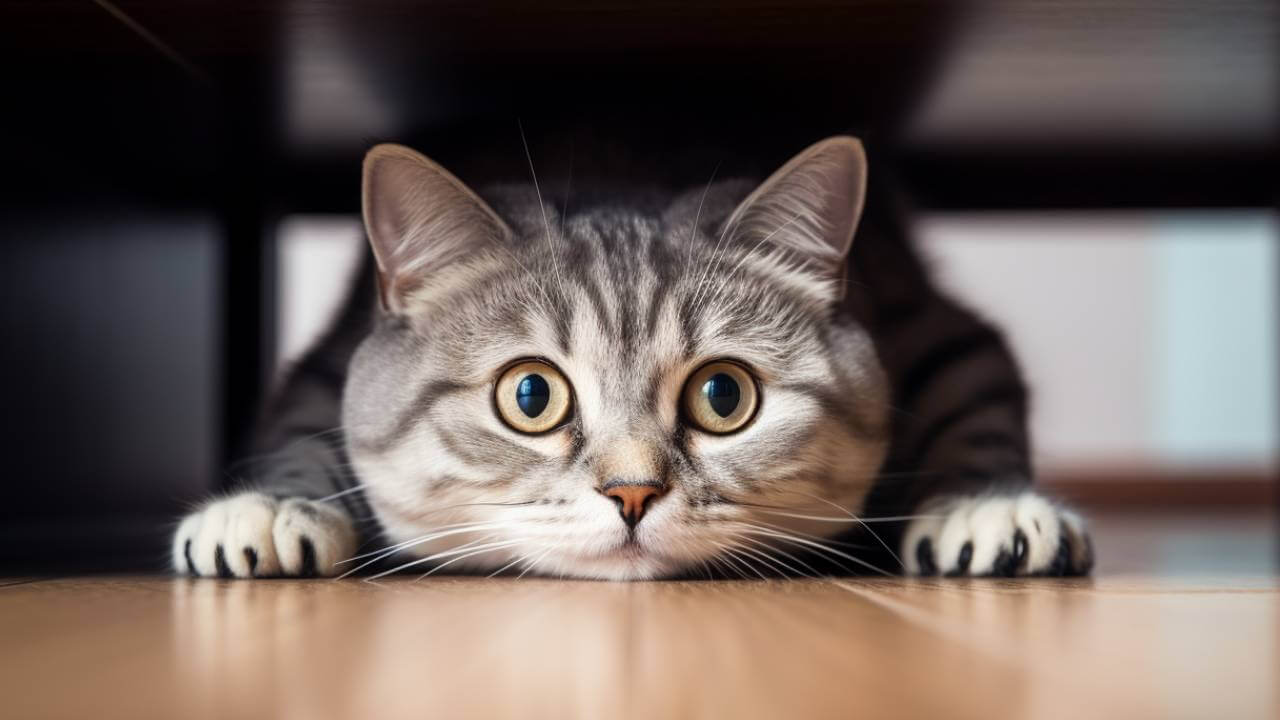Cats are usually curious and confident, but sometimes something spooks them, and their behavior changes in an instant. If your playful buddy suddenly starts hiding, avoiding you, or acting completely out of character, it’s clear something’s thrown them off. Figuring out what’s behind that fear is the first step to helping them feel safe and at ease again.
We’ll explore some common reasons your cat might feel scared and share simple ways to help them return to their happy, relaxed self.
Quick Navigation Links:
- Common Signs That Your Cat Is Scared
- 10 Possible Reasons for Sudden Fear in Cats
- How to Help a Scared Cat
- Preventing Future Fear Episodes
- FAQs
Common Signs That Your Cat Is Scared
Cats have their own unique ways of showing fear, and it’s not always as obvious as you might think. Here are some signs to watch for:
- Hiding: Your cat might retreat to small, enclosed spaces like under the bed or behind furniture.
- Avoiding Interaction: They may shy away from being touched, picked up, or approached.
- Body Language Changes: Flattened ears, a puffed-up tail, and crouching or wide, dilated eyes can all signal fear.
- Vocalization: Excessive meowing, growling, or hissing might mean your cat is feeling anxious or scared.
- Sudden Aggression: A scared cat might lash out by swatting or biting if they feel cornered.
- Changes in Behavior: A previously active cat might become withdrawn, stop playing, or lose interest in their usual routines.
- Loss of Appetite: Fear can sometimes cause a cat to stop eating or drinking.
Common Signs That Your Cat Is Scared
Cats can be sensitive to various triggers, and sudden fear can arise from unexpected changes in their environment, health, or experiences. Here are 10 possible reasons your cat might be scared:
1. Loud Noises
Sudden loud sounds like thunder, fireworks, or construction noise can easily startle a cat. Their acute hearing makes them more susceptible to being frightened by sounds humans might barely notice.
2. New Pets or People
Introducing a new pet or person into the home can disrupt your cat’s sense of security. They may see the newcomer as a threat and react with fear or anxiety until they adjust.
3. Unfamiliar Scents
Cats rely heavily on their sense of smell. A new piece of furniture, cleaning products, or even a guest’s perfume can create discomfort.
4. Previous Trauma
Cats that have been through a traumatic experience—such as abandonment, abuse, or a stressful shelter environment—might react fearfully to seemingly harmless stimuli that remind them of the past.
5. Health Problems
Pain, discomfort, or illness can make your cat feel vulnerable. If your cat’s sudden fear persists, it’s worth consulting a veterinarian to rule out any underlying medical issues.
6. Environmental Changes
Cats thrive on routine; even small changes like moving furniture, adding new decor, or changing their feeding schedule can unsettle them.
7. Conflicts with Other Pets
Disagreements with other animals in the household can make a cat feel unsafe. This might be due to territorial disputes or bullying behavior from another pet.
8. Strangers in the Home
Hosting visitors can be intimidating for cats, especially if they’re naturally shy or unaccustomed to having strangers in their space.
9. Sudden Movements or Handling
Cats prefer predictability, and sudden attempts to grab, pick up, or corner them can lead to fear or defensive reactions.
10. Outdoor Stressors
If your cat has access to windows or spends time outdoors, they might be scared by neighborhood animals, unfamiliar people, or unexpected sights like a barking dog or a wild animal.

How to Help a Scared Cat
Helping a scared cat regain their confidence requires patience, understanding, and a few practical strategies. Here are effective ways to comfort your cat:
- Provide a Safe Space
Create a quiet, secure area where your cat can retreat. A cozy hiding spot, like a heated cat bed or a small box, can help them feel protected. - Use Calming Products
Feline pheromone sprays or diffusers can create a soothing environment by mimicking natural scents that promote relaxation. - Keep the Environment Predictable
Stick to a consistent routine for feeding, playtime, and interaction. Cats thrive on familiarity, and predictability reduces stress. - Give Them Space
Avoid forcing interaction. Let your cat come to you when they feel ready. Too much attention can overwhelm them further. - Address Potential Triggers
Identify and minimize stressors. For example, lower the volume of loud devices or limit exposure to unfamiliar pets or people. - Engage in Play
Gentle, interactive play with toys like feather wands or laser pointers can help your cat regain confidence and redirect their focus. - Use Positive Reinforcement
Reward calm behavior with treats, gentle petting, or soothing words. Positive reinforcement helps build trust over time. - Provide Vertical Spaces
Cats feel safer when observing their surroundings from a higher vantage point. Cat trees or shelves can give them the security they need. - Stay Calm Yourself
Cats pick up on human emotions. Speak softly, move slowly, and avoid reacting strongly to their behavior. Your calmness will reassure them. - Consult a Veterinarian or Behaviorist
If fear persists, seek professional advice. A vet can rule out health issues, while a behaviorist can develop a tailored plan to help your cat feel secure again.

Preventing Future Fear Episodes
Preventing fear in cats means creating a safe and secure environment. Here are effective ways to reduce the chances of future fear episodes:
- Maintain a Stable Routine
Consistency in feeding times, play sessions, and daily interactions helps your cat feel grounded and less prone to anxiety. - Introduce Changes Gradually
If you’re moving furniture, bringing in new pets, or making household changes, do it step by step to give your cat time to adjust. - Socialize Early and Gently
Gradual exposure to new people, pets, and environments can help your cat develop confidence over time, especially if they’re young. - Provide Safe Spaces
Designate quiet, cozy areas your cat can retreat to during stressful situations, such as visitors or loud noises.
Do cats really need a cat bed for comfort? <==Read more.
- Minimize Triggers
Be mindful of stressors like sudden loud sounds, unfamiliar animals near windows, or overly energetic guests. Reducing exposure to these can make a big difference. - Engage in Regular Play
Interactive play strengthens your bond and gives your cat a positive outlet for their energy, reducing stress and promoting relaxation. - Keep Up with Vet Visits
Regular check-ups ensure your cat’s health is in good shape, as medical issues can often cause anxiety or fear.
These measures can help your cat feel more confident, secure, and happy.
Helping your cat overcome fear isn’t always easy, but with a little patience and understanding, you can make a world of difference. By creating a safe space, sticking to a routine, and addressing any triggers, your feline friend can regain their confidence and return to their happy, curious self.
And here’s a thought: if your cat seems lonely or nervous, maybe they just need a new buddy to share their space with! Check out our kittens for sale, available for adoption from trusted breeders, and find the perfect companion to bring a little extra joy (and mischief) into their life. After all, two cats are better than one! 😊

FAQs
Why does my cat suddenly freeze and stare at nothing?
Cats may freeze and stare if they sense something subtle, like a sound or movement you don’t notice. Their heightened senses make them hyper-aware of their surroundings.
How long does it take for a scared cat to calm down?
The time varies. Some cats recover in minutes, while others might take hours or even days, depending on the trigger and their personality.
Is it okay to comfort my cat when they’re scared?
Yes, but do so calmly. Avoid forcing interaction; speak softly and let them approach you on their terms.
Are there natural remedies to help a scared cat?
Yes, options like calming pheromones, herbal supplements (e.g., valerian root or chamomile), and stress-reducing collars can be effective.
Why does my cat suddenly run and hide when guests arrive?
Unfamiliar people bring new scents and sounds that can overwhelm your cat. Providing a quiet room for them to retreat to during visits can help.
Should I use music to calm a scared cat?
Yes, soft classical music or specially designed cat relaxation tracks can help soothe your pet. Keep the volume low and let them get used to it gradually.
References:
- Understand why cats might exhibit fearful behavior on the Fear of Cats page.
- Hear from experts on the unique behaviors of cats and why they might suddenly exhibit signs of anxiety in Why Cats Are Freaking Out Behaviour expert speech.
- The common fear triggers in the article: 4 shocking facts about fear.
- The complexities of feline emotions and anxiety are in the Feline Fear and Anxiety government source.






My cat has been acting skittish lately. Thanks for the insights on why cats can suddenly become fearful!